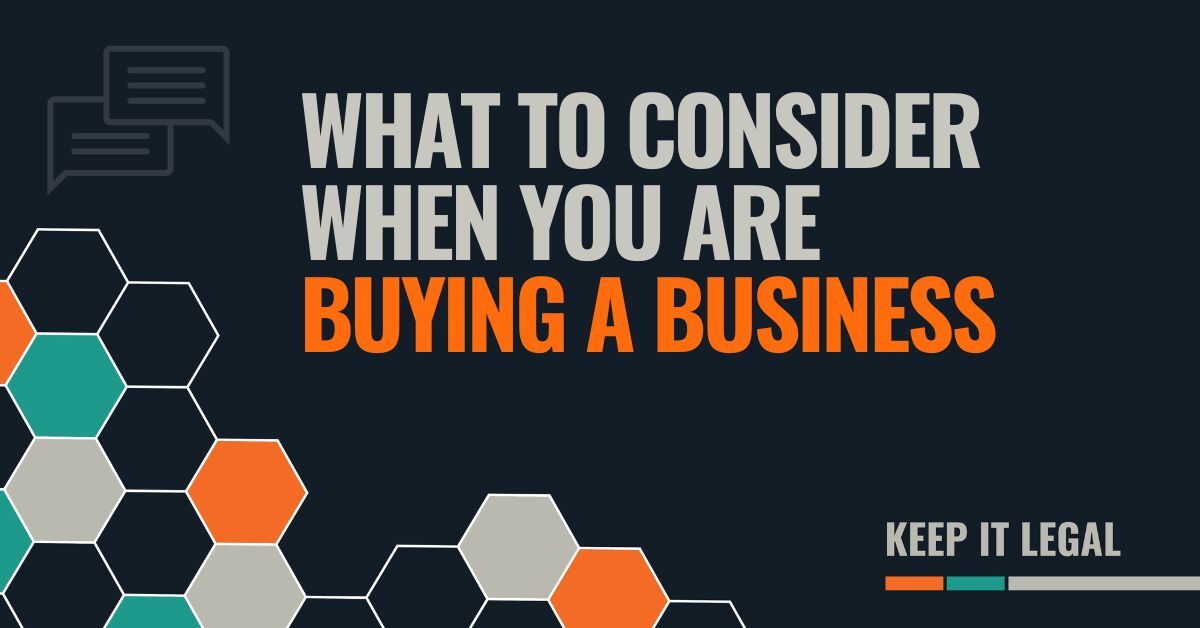I often assist clients who are buying businesses. Whether it’s your first time buying a business or you’ve done this before, there are some important legal considerations to be aware of.
This post won’t cover the financial or tax aspects of purchasing a business. There are a lot of good resources out there to assist with those issues (my #1 piece of advice here is to hire a good CPA). Instead, we’re going to look at some of the legal points on the checklist.
The first question to ask is whether you are buying the assets (and, possibility, liabilities) of the business, or instead, if you’re buying the business entity itself.
Let’s say you’re purchasing an independent retail business. You need to know if the store is held as a corporation, LLC, sole proprietorship, or partnership. If it’s a corporation or LLC, you may simply want to buy 100% of the equity. The advantage of that approach is that it’s relatively quick and easy. You are stepping into the shoes of the old owners. The downside is that you may also assume all of the liability of the corporation or LLC. If there are creditors out there who have claims against the company, you’re the person who may have to defend – or pay – those claims.
In order to avoid that, you may want to set up a new entity (such as an LLC or corporation – we’ll call it NewCo) and have NewCo buy the assets of the seller’s business. This may not relieve you of all prior liability, but, if the transaction is properly structured, it could give the business a clean start. Your strategic legal counsel can assist with the structure of the transaction. The seller may also want to offload some of their liability onto you, the buyer; that’s a point of negotiation.
How you are buying the business will also guide what type of legal documents you need in order to effectively purchase the business. Those documents may include an Asset Purchase Agreement, a Stock Purchase Agreement, a Bill of Sale, a Note, or other types of contracts. Of course, the best practice is to have an experienced business attorney work with you to create and review the documents.
PSA: Never let the seller’s lawyer draft the documents for you. Make sure you have your own legal representation. Even if the seller is your friend or a trusted relative. OK, back to the list…
Next question – is the business in compliance? Meaning, is it up to date on all taxes, government filings, corporate minutes, and other documentation that’s required? If the business you’re buying needs some cleanup work, be sure to take that into account when negotiating the purchase. You don’t want to buy a business that’s advertised as “turnkey ready” only to discover that it’s a fixer-upper.
Intellectual property considerations are always important. Has the business registered its name, logo, and other important branding elements as trademarks? If so, make sure that the proper steps have been taken to transfer those registrations. Does the business own other intellectual property, such as websites, social media accounts, domain names, written copy or video elements, patents or patentable inventions, trade secrets – and are they properly documented and protected? How will they be transferred to you?
The next question is whether the business has employees. You will, of course, have to get a good understanding of who those employees are, what their wages and other compensation are, and any terms of their employment. If you’re transferring the assets of the seller’s entity into your business, you may need to have the seller terminate all of the employees on the date you take over and re-hire them as employees of your new company. Of course, this can be a delicate matter, so give yourself plenty of time to work through the details of this process.
You should also review any significant contracts the business has with vendors, suppliers, customers, clients, contactors, and other relevant 3rd parties. Be careful to take a look at any “assignment” clauses in those contracts to ensure that the seller can simply hand the contracts over to you. Some contracts may have terms that require the other party to approve an assignment or transfer of the contract. If that’s the case, make sure the seller handles that for you so you’re not scrambling to renegotiate a contract that you thought was a valuable asset of the business. Your strategic legal counsel can review key documents in the due diligence process to make sure you are covered.
Does the business have a lease? If so, what’s involved in transferring the lease to you? Did the business owner personally guarantee the lease, and will you be required to do so as well?
Finally, make sure you review any licenses that the business or the seller has, to ensure that they can transfer to you as the new owner.
Of course, these are just a few of the considerations to keep in mind when you’re buying a business.
If you’re buying a business, and you want to discuss the legal ins and outs, feel free to contact me.


